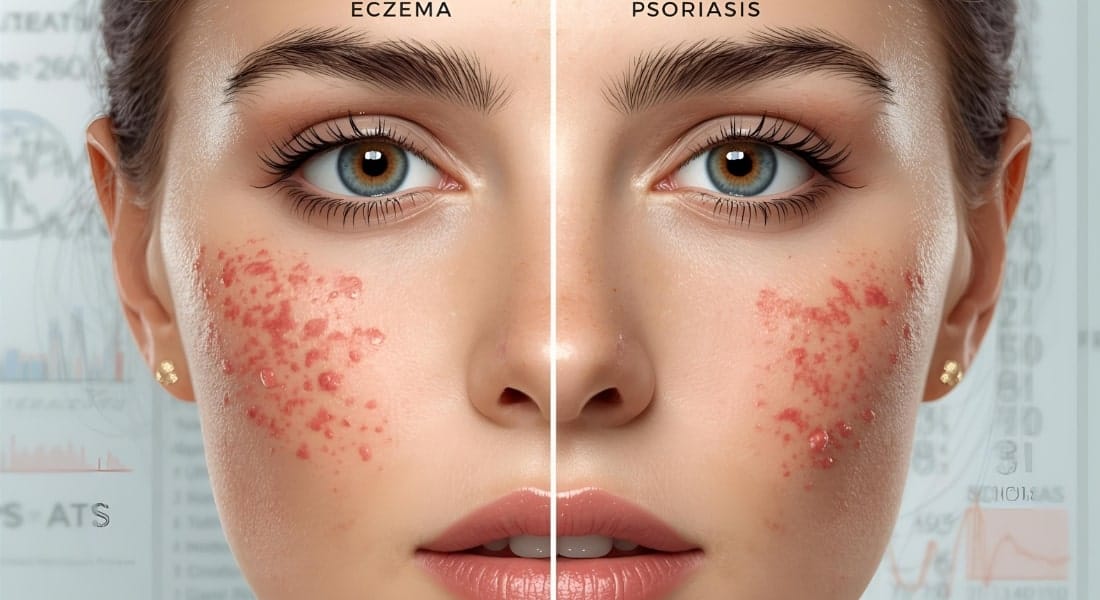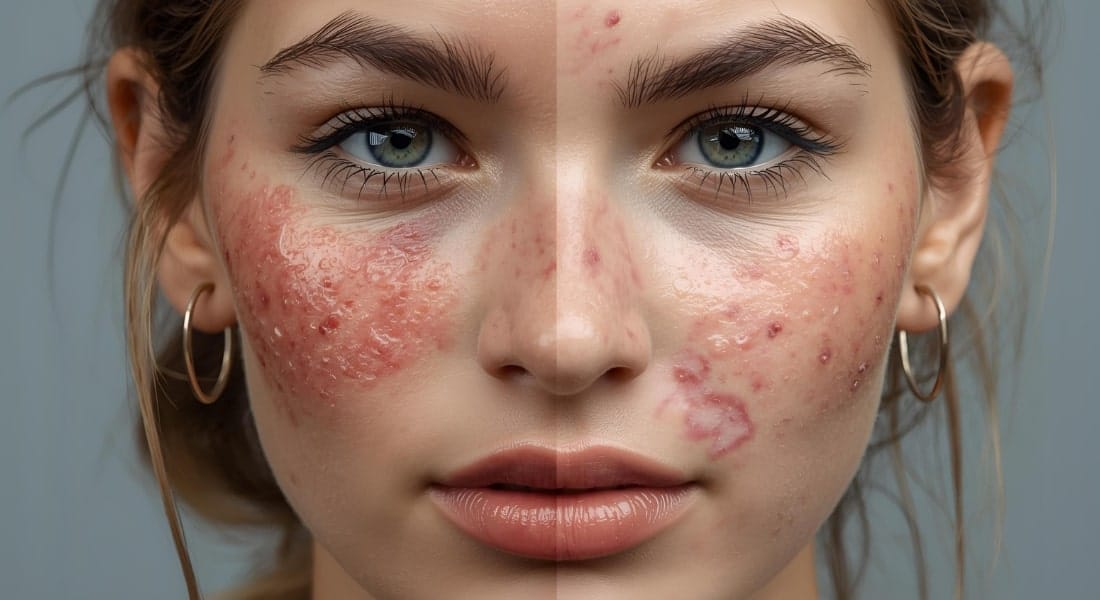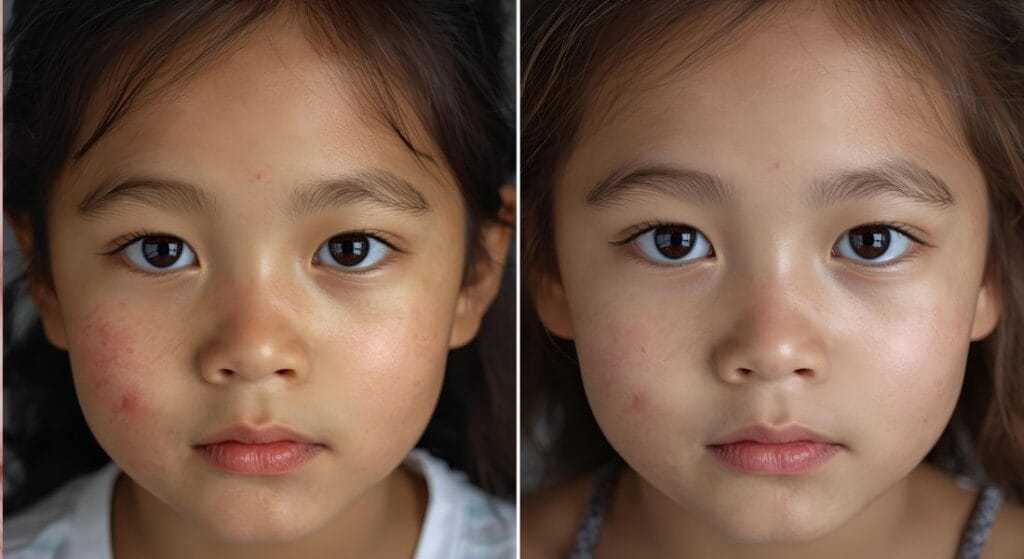Eczema and psoriasis are two of the most common chronic inflammatory skin conditions worldwide. While both can cause a great deal of discomfort, including itchy, red, and inflamed skin, they are distinct conditions with different causes, symptoms, and treatment protocols. Patients, caregivers, and even healthcare professionals can sometimes confuse the two, but an accurate diagnosis is the first and most critical step toward effective management. This article will break down the difference between eczema and psoriasis to help you better understand your condition. We’ll also highlight how Aakaar Medical Technologies Ltd offers advanced skincare solutions for both, including the SWYADA EXOCICAR range for eczema and the Tinefcon range for psoriasis.
Understanding Eczema
Eczema, a term often used to refer to atopic dermatitis, is a chronic skin condition that makes your skin red and itchy. It is caused by a combination of genetics, an overactive immune system, and a compromised skin barrier. The primary problem with eczema is a dysfunctional skin barrier, which allows moisture to escape and irritants and allergens to enter. This triggers a cycle of inflammation, itching, and a damaged skin barrier. It is not contagious.
Eczema symptoms can vary from person to person but typically include:
- Intense itching that can be severe, especially at night.
- Red, inflamed, and often weeping skin patches.
- Dry, scaly, or thickened skin.
- Small, raised bumps that may leak fluid when scratched.
- Skin sensitivity and a predisposition to bacterial infections.
While there is no cure for eczema, managing it involves a focus on repairing the skin barrier and reducing inflammation. SWYADA EXOCICAR is an advanced product specifically formulated to provide relief for eczema-prone skin. It contains ingredients that soothe inflammation and help restore the skin’s natural barrier, providing targeted eczema skincare products that work.
Understanding Psoriasis
Psoriasis is a chronic autoimmune skin disease where the body’s immune system mistakenly attacks healthy skin cells, causing them to multiply at an accelerated rate. Normally, skin cells mature and shed in about a month, but in a person with psoriasis, this process takes only a few days. The result is a build-up of skin cells on the surface. Psoriasis is not contagious.
The key psoriasis symptoms are distinct from eczema and include:
- Thick, red patches of skin (plaques) covered with silvery-white scales.
- Typically located on the scalp, elbows, knees, and lower back. Psoriasis can also affect the nails and joints.
- Itching, but it is often described as a burning or stinging sensation rather than a pervasive itch.
- Cracked, bleeding skin in severe cases.
- Joint pain and stiffness in a related condition called psoriatic arthritis.
Psoriasis management requires a dual approach—treating the topical symptoms and addressing the underlying autoimmune response. Aakaar Medical Technologies Ltd offers a comprehensive range of psoriasis skincare products with the Tinefcon range. Tinefcon Tablets provide systemic relief by targeting the root cause from within. For topical relief, Tinefcon Cream helps reduce inflammation and scaling, while Tinefcon Scalp Cleanser and Tinefcon Skin Cleanser offer gentle, effective cleansing for affected areas, without stripping the skin.
Eczema vs Psoriasis: Key Differences
While both conditions share some similarities, understanding their key distinctions is paramount. This breakdown of eczema symptoms vs psoriasis symptoms can help you distinguish between the two.

- Underlying Cause:
- Eczema is primarily a barrier dysfunction. The skin is leaky, allowing allergens and irritants in, triggering an immune response.
- Psoriasis is an autoimmune disease where the immune system directly attacks the skin, causing rapid cell turnover.
- Appearance:
- Eczema patches are often red, inflamed, and can be oozy or crusty. The skin between patches can feel very dry.
- Psoriasis plaques are distinct, thick, well-defined red patches covered with silvery scales.
- Location:
- Eczema commonly appears in skin folds, such as the insides of elbows and knees, as well as on the neck and wrists. It is also common in infants’ scalps and cheeks.
- Psoriasis typically affects the outer surfaces, such as elbows, knees, and the scalp.
- Symptoms:
- Eczema is characterized by an intense, overwhelming itch.
- Psoriasis is more likely to cause stinging or burning, along with itching. The patches are often very thick and scaly.
| Feature | Eczema (Atopic Dermatitis) | Psoriasis |
| Nature | Skin barrier dysfunction | Autoimmune disease |
| Appearance | Red, inflamed, oozing, weeping skin | Thick, scaly, silvery plaques |
| Primary Sensation | Intense, pervasive itch | Stinging, burning, itching |
| Common Locations | Inner elbows/knees, neck, wrists | Outer elbows/knees, scalp, lower back |
| Affected Skin | Surrounding skin is often dry | Plaques are well-defined with healthy skin nearby |
You should seek a professional diagnosis if you have persistent itchy or scaly skin. A dermatologist can perform a physical examination and take a detailed patient history to understand your symptoms and potential triggers. In some cases, a small skin biopsy may be taken to confirm the diagnosis by differentiating between the cellular patterns of eczema vs psoriasis. How to tell if you have eczema or psoriasis can be difficult on your own, but a dermatologist has the expertise to make a correct diagnosis and create a tailored treatment plan. Misdiagnosis can lead to ineffective treatment and prolong your discomfort, so it’s a step you shouldn’t skip.
Treatment Approaches for Eczema and Psoriasis
As they have different root causes, eczema and psoriasis treatment options are distinct.
Eczema Management
The primary goal is to repair the skin barrier and reduce inflammation.
- Moisturizing: Frequent, consistent moisturizing is vital to lock in moisture and protect the skin barrier.
- Trigger Avoidance: Identifying and avoiding triggers like harsh soaps, certain fabrics, and allergens is key.
- Topical Solutions: Products like SWYADA EXOCICAR are excellent for soothing inflamed skin and repairing the barrier. This product is designed to provide targeted relief, reducing redness and helping to restore the skin’s natural balance.
Psoriasis Management
The goal is to slow down the rapid skin cell turnover and calm the immune system.

- Topical Therapies: Medicated creams, foams, and ointments are the first line of defense. The Tinefcon Cream is an effective topical solution.
- Systemic Treatments: For moderate to severe psoriasis, a dermatologist may prescribe oral medications or biologics that work from within. Tinefcon Tablets are a unique oral option that can help with systemic inflammation.
- Phototherapy: Exposure to specific wavelengths of UV light can help slow down skin cell growth.
- Specialized Cleansers: Using a gentle, specially formulated cleanser, such as Tinefcon Scalp Cleanser and Tinefcon Skin Cleanser, can help remove scales without irritating the skin, preparing it for other treatments.
Living with Chronic Skin Conditions
Living with a chronic skin condition, whether it’s eczema or psoriasis, can have a significant emotional impact. It’s important to be patient and consistent with your skincare routine. Finding the right eczema skincare products or psoriasis skincare products can make a world of difference. Regular communication with your dermatologist, stress management, and a healthy lifestyle are all crucial components of successful long-term management.
Frequently Asked Questions
Q: What is the main difference between eczema and psoriasis?
A: The main difference is the underlying cause. Eczema is primarily a skin barrier disorder, leading to inflammation from external irritants. Psoriasis is an autoimmune disease where the immune system causes skin cells to multiply too quickly, resulting in thick plaques.
Q: Can you have both eczema and psoriasis?
A: Yes, it is possible, though rare. The symptoms may be distinct on different parts of the body. A dermatologist can help determine if you have both conditions and create a treatment plan for each.
Q: What triggers eczema flare-ups?
A: Common eczema triggers include dry skin, irritants like harsh soaps and detergents, allergens like pollen and pet dander, and stress.
Q: What triggers psoriasis flare-ups?
A: Psoriasis flare-ups can be triggered by stress, infections (like strep throat), cold and dry weather, certain medications, and skin injuries.
Q: Which products help manage eczema and psoriasis?
A: For eczema, look for products that hydrate and repair the skin barrier, such as SWYADA EXOCICAR. For psoriasis, products that reduce inflammation and slow down cell growth are key. The Tinefcon range, with its systemic and topical solutions, is specifically designed for psoriasis management.
Conclusion

While they may look similar, eczema and psoriasis are different conditions that require specific, tailored treatments. Eczema is a skin barrier issue driven by inflammation and triggers, while psoriasis is a direct result of an overactive immune system. Understanding this fundamental difference is the key to finding relief.
At Aakaar Medical Technologies Ltd, we are committed to providing innovative solutions for these challenging conditions. For effective, soothing relief for eczema, explore SWYADA EXOCICAR, a product designed to help repair and protect the skin barrier. For psoriasis, our comprehensive Tinefcon range offers a complete regimen, from systemic relief with Tinefcon Tablets to targeted topical care with our creams and cleansers. By choosing the right products and working with your dermatologist, you can take control of your skin health.

